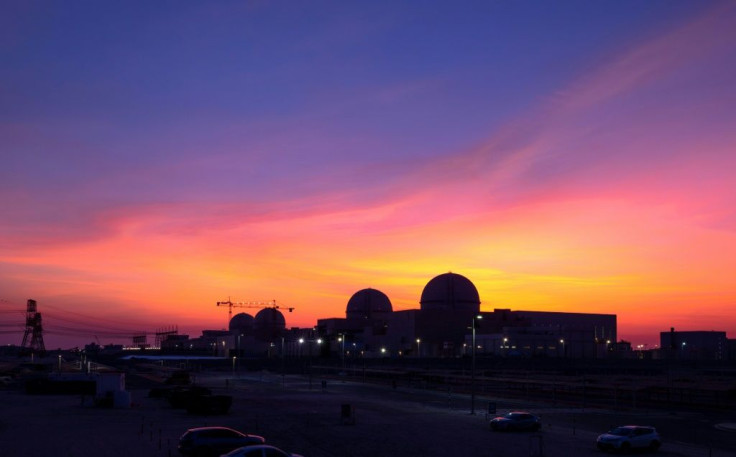UAE Gains License To Start First Nuclear Power Plant In Arab Region

KEY POINTS
- Iraq's nuclear ambitions were ended by an Israeli air strike in 1981
- Saudi Arabia and Egypt also plan to build nuclear plants
- UAE is seeking to diversify it domestic energy sector away from oil
The United Arab Emirates received an operating license from its independent regulatory watchdog, the Federal Authority for Nuclear Regulation, or FANR, to activate the Barakah nuclear reactor, thereby putting UAE on the path towards becoming the first Arab nation to operate a commercial nuclear power plant.
The license is expected to last 60 years.
Run by Nawah Energy, a joint venture between the state-run Emirates Nuclear Energy Corp. and Korea Electric Power Corp., the Barakah facility can begin loading fuel and then progress toward full commercial operation within a few months.
Nawah Energy “can fulfill all the safety requirements of the UAE,” said Christer Viktorsson, head of FANR.
“[This] is another milestone for the UAE, culminating efforts of 12 years towards the development of the UAE nuclear energy program,” said Hamad al Kaabi, the UAE’s permanent representative to the International Atomic Energy Agency, or IAEA. “The [UAE] nuclear energy plan… conforms to standards of the IAEA and international best practices.”
Barakah will be the first of four civilian nuclear reactors that the UAE government plans to run by 2023 – the plants are estimated to cost $25 billion. The government expects them to produce as much as 5.6 gigawatts upon commission, or nearly one-fifth of the country’s current installed generating capacity.
Al Kaabi, who also serves as FANR’s deputy chairman, said Bakarah’s three other reactors are presently in “advanced levels of construction.”
Barakah’s Unit 1 reactor is located in the remote Gharbiya region of Abu Dhabi on the Persian Gulf coast.
While Saudi Arabia and Egypt also plan to go nuclear, other regional states – most notably Saddam Hussein’s Iraq – sought and failed to establish themselves as nuclear powers. Israel destroyed Saddam’s atomic aspirations by bombing the Osiris research reactor in Iraq in 1981.
Now it appears that UAE – currently the third-largest oil producer among the Organization of Petroleum Exporting Countries – will be the first nuclear Arab state as it seeks to diversify its domestic energy sector away from oil.
Dubai, the UAE’s commercial center, wants 75% of its power needs to be provided by solar energy and other renewable sources by 2050.
However, Mycle Schneider, a Paris-based nuclear energy consultant, is skeptical about the region’s nuclear ambitions.
“Barakah was meant to be the showcase for the international nuclear industry,” he said. “Grid connection is at least three years late, and there is no doubt that it is way overbudget.”
He added that nuclear power is now the most expensive form of electricity generation, citing that while the cost of solar photovoltaic power has dropped by 90% over the past decade, nuclear power costs have since climbed by 26%.
Mark Hibbs, nonresident senior fellow at the Carnegie Endowment for International Peace’s Nuclear Policy Program, said the UAE has deep pockets but it still must find local experts to keep these plants running smoothly.
“That won’t be trivial because when this project got underway virtually all of the expertise was imported from outside,” he said.
The UAE also signed an agreement with the U.S. under which it may receive nuclear materials, equipment and know-how from the U.S., but prohibits it from carrying out uranium enrichment and fuel reprocessing, i.e., the necessary steps required for building an atomic bomb.
“When we started the [nuclear] program, we made it really clear that we are developing a program that is peaceful, that is driven by the need for additional electricity,” Al Kaabi said. “It’s a model nuclear power program, a very systematic approach… It gives a lot of countries in the [Gulf] region a way to develop such responsible programs… without raising concerns about other issues related to nuclear power such as non-proliferation and so on.”
Al Kaabi added: “This is a program that has been done in cooperation and with full support of the international community, it has resulted in receiving the most advanced technology, receiving the best practices and training, and it has been today proven successful in achieving its goals through this approach. So we are demonstrating that there is a right way to develop a nuclear power program.”
However, neighboring Qatar has expressed its fears over UAE’s nuclear program.
Qatar's foreign affairs ministry sent a letter last March to IAEA warning that a radioactive plume from an accidental discharge at Barakah could reach its capital, Doha and that a radiation leak could harm the local water supply.
© Copyright IBTimes 2024. All rights reserved.





















